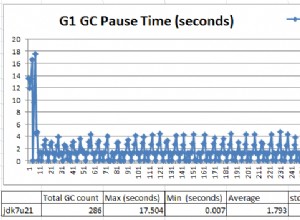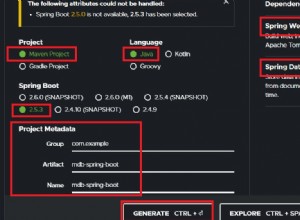Resep ini akan menggunakan kelas MongoOutputFormat untuk memuat data dari instance HDFS ke dalam koleksi MongoDB.
Getting ready
Cara termudah untuk memulai dengan Adaptor Mongo Hadoop adalah dengan mengkloning proyek Mongo-Hadoop dari GitHub dan membangun proyek yang dikonfigurasi untuk versi Hadoop tertentu. Gitclient harus diinstal untuk mengkloning proyek ini. Resep ini mengasumsikan bahwa Anda menggunakan distribusi CDH3 dari Hadoop. Klien Git resmi dapat ditemukan di https://git-scm.com/downloads .
Adaptor Hadoop Mongo dapat ditemukan di GitHub di https://github.com/mongodb/ mongo-hadoop. Proyek ini perlu dibangun untuk versi Hadoop tertentu. File JAR yang dihasilkan harus diinstal pada setiap node di folder $HADOOP_HOME/lib. Driver Java Mongo harus diinstal pada setiap node di folder $HADOOP_HOME/lib. Itu dapat ditemukan di https://github.com/mongodb/mongo-java-driver / unduhan .
Bagaimana caranya...
Complete the following steps to copy data form HDFS into MongoDB:
1. Clone the mongo-hadoop repository with the following command line:
git clone https://github.com/mongodb/mongo-hadoop.git
2. Switch to the stable release 1.0 branch:
git checkout release-1.0
3. Set the Hadoop version which mongo-hadoop should target. In the folder
that mongo-hadoop was cloned to, open the build.sbt file with a text editor.
Change the following line:
hadoopRelease in ThisBuild := "default"
to
hadoopRelease in ThisBuild := "cdh3"
4. Build mongo-hadoop :
./sbt package
This will create a file named mongo-hadoop-core_cdh3u3-1.0.0.jar in the
core/target folder.
5. Download the MongoDB Java Driver Version 2.8.0 from https://github.com/
mongodb/mongo-java-driver/downloads .
6. Copy mongo-hadoop and the MongoDB Java Driver to $HADOOP_HOME/lib on
each node:
cp mongo-hadoop-core_cdh3u3-1.0.0.jar mongo-2.8.0.jar $HADOOP_
HOME/lib
7. Create a Java MapReduce program that will read the weblog_entries.txt file
from HDFS and write them to MongoDB using the MongoOutputFormat class:
import java.io.*;
import org.apache.commons.logging.*;
import org.apache.hadoop.conf.*;
import org.apache.hadoop.fs.Path;
import org.apache.hadoop.io.*;
import org.apache.hadoop.mapreduce.lib.input.FileInputFormat;
import org.apache.hadoop.mapreduce.lib.input.TextInputFormat;
import org.apache.hadoop.mapreduce.*;
import org.bson.*;
import org.bson.types.ObjectId;
import com.mongodb.hadoop.*;
import com.mongodb.hadoop.util.*;
public class ExportToMongoDBFromHDFS {
private static final Log log = LogFactory.getLog(ExportToMongoDBFromHDFS.class);
public static class ReadWeblogs extends Mapper<LongWritable, Text, ObjectId, BSONObject>{
public void map(Text key, Text value, Context context)
throws IOException, InterruptedException{
System.out.println("Key: " + key);
System.out.println("Value: " + value);
String[] fields = value.toString().split("\t");
String md5 = fields[0];
String url = fields[1];
String date = fields[2];
String time = fields[3];
String ip = fields[4];
BSONObject b = new BasicBSONObject();
b.put("md5", md5);
b.put("url", url);
b.put("date", date);
b.put("time", time);
b.put("ip", ip);
context.write( new ObjectId(), b);
}
}
public static void main(String[] args) throws Exception{
final Configuration conf = new Configuration();
MongoConfigUtil.setOutputURI(conf,"mongodb://<HOST>:<PORT>/test. weblogs");
System.out.println("Configuration: " + conf);
final Job job = new Job(conf, "Export to Mongo");
Path in = new Path("/data/weblogs/weblog_entries.txt");
FileInputFormat.setInputPaths(job, in);
job.setJarByClass(ExportToMongoDBFromHDFS.class);
job.setMapperClass(ReadWeblogs.class);
job.setOutputKeyClass(ObjectId.class);
job.setOutputValueClass(BSONObject.class);
job.setInputFormatClass(TextInputFormat.class);
job.setOutputFormatClass(MongoOutputFormat.class);
job.setNumReduceTasks(0);
System.exit(job.waitForCompletion(true) ? 0 : 1 );
}
}
8. Export as a runnable JAR file and run the job:
hadoop jar ExportToMongoDBFromHDFS.jar
9. Verify that the weblogs MongoDB collection was populated from the Mongo shell:
db.weblogs.find();




